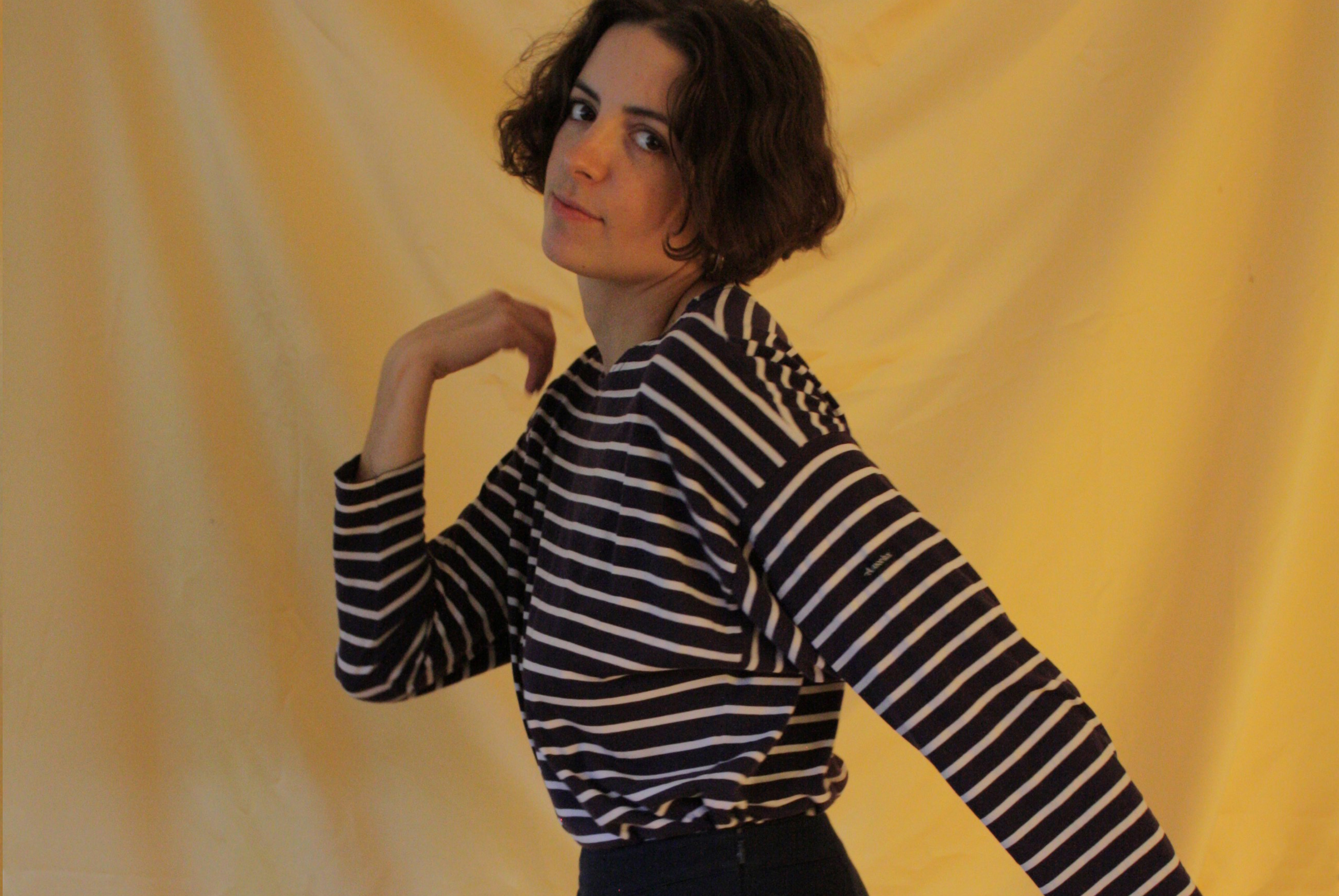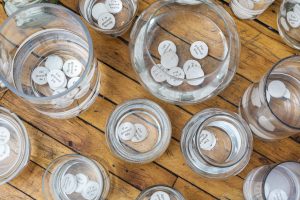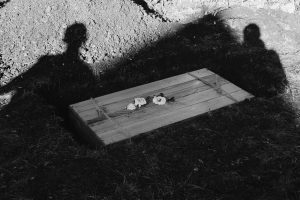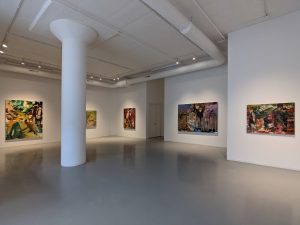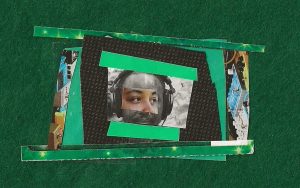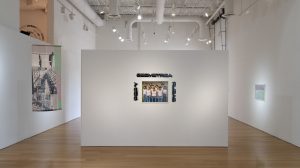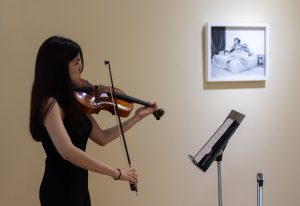I first saw Maria Jacobson from Fran play over the summer at The Hideout. Her voice, which I had previously only heard on Bandcamp, was atmospheric. It was natural. Her lyrics, empathetic and encapsulated with raw emotion and narrative, were something I could cry to.
In short, I’ve been trying to pencil as many Fran shows into my calendar ever since.
I met Maria in Humboldt Park, where we chatted about where she is going and what she is doing since picking up music a year ago.
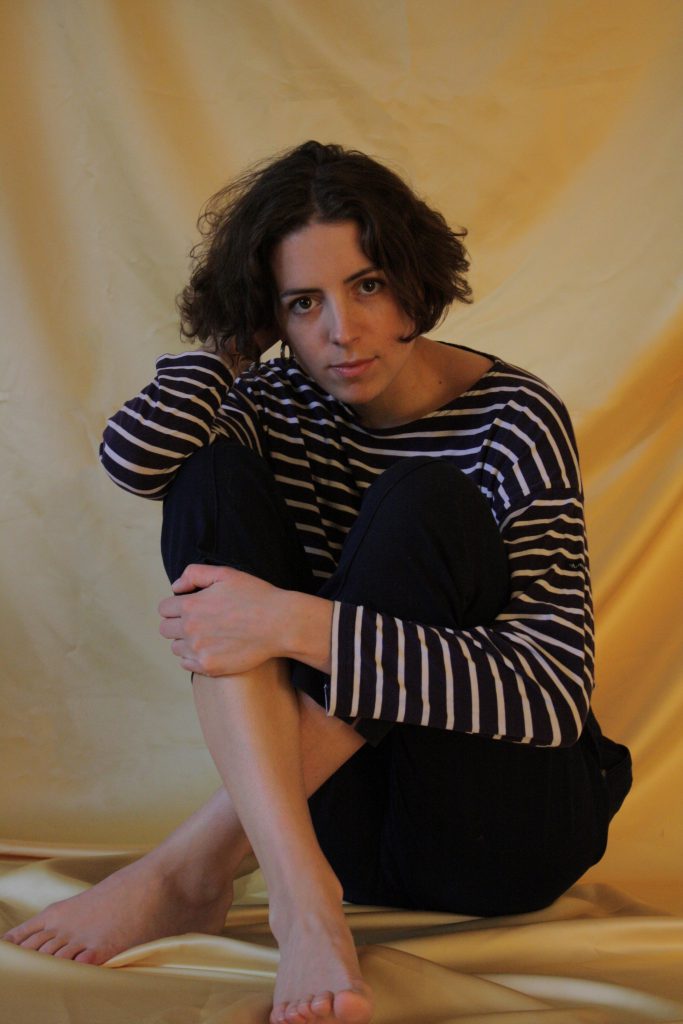
S. Nicole Lane: You studied theater, right?
Maria Jacobson: Yeah, so I went to school for acting—for theater—and was pretty set on being an actor when I moved back home [Chicago], and did it for a year. I did musical theater growing up, so I have a strong singing background, and also studied some music in college—sort of broadly. I was the singer in bands—in high school and college—but never had a personal songwriting practice. I was trying to be an actor for a year, and then two year ago I got an acting gig—a summer theater job in Indiana. I bought a guitar in Lafayette, Indiana and started learning how to play. I kind of realized that’s what I wanted to spend my time doing. I wrote songs as I learned the guitar, and I was surprised at how good and easy it felt. So I was like, oh, this is telling me something. By that point, I was really frustrated with acting as a…life schedule. Or just the lifestyle of an actor, where you were always at the mercy of someone else, and your time was never your own. My evenings were always taken up by rehearsal, it was hard to have jobs that were flexible enough to allow for both auditions, or classes during the day, and rehearsals or performances at night. It never felt like a personal practice. It felt like I was always sort of pandering to someone else. Yeah, when I started playing guitar it felt really good. And then I went to Mexico for four months, and had an English teaching job that gave me a lot of time. I just sat in my little studio apartment.
SNL: That sounds so romantic.
MJ: Yeah, it was! It was pretty dreamy. I had a terrace and these windows that opened into a courtyard.
SNL: Where were you in Mexico?
MJ: Zacatecas, which is like central Mexico—an old colonial, small city. Everyone there knew each other except me; they all knew me as the tall, white girl walking around. It just gave me the space and the time to work. I played guitar every day. I’d teach in the morning, come home, play guitar, write songs, teach at night, get tacos, and come back home. It didn’t even bother me that I wasn’t that social. It was this, like, residency, which felt really awesome.
SNL: A retreat.
MJ: I just unplugged. It was awesome.
SNL: How is your writing—songwriting—process now? How is it different from that experience?
MJ: I write way less now. I mean, I don’t have the luxury of all day to write. I used the guitar. I figured out what I needed the guitar to do for me. I’m not trying to shred or anything. I just need to play while I sing. So, there’s less need to practice getting my hands acquainted…or strengthened. Usually before I go to bed I’ll sit with my acoustic guitar. A lot of times I still will use it kind of in response to things that happen in my life. If I’m overwhelmed with anxiety or trying to unwrap some emotion, I’ll kind of take to the guitar. Which sounds like, I dunno, melodramatic or something, but it really helps. It’s very therapeutic. There have been times that I literally don’t know what else to do, so I just pick up my guitar. Sometimes cool stuff comes out and sometimes it doesn’t. And usually I’ll have like a spurt of—
SNL: Of cool stuff.
MJ: —of cool stuff. It doesn’t work to say, “Oh, tonight at 7:30, I’m gonna write three songs.” But I’ve found that a similarity between my time in Mexico and now is that it’s always in those moments where I retreat. The moments where I close the door and, you know, I’m back in that alone space. And that’s why I think the time before I go to bed is really important and sometimes even right before I leave for work, if no one else is awake.
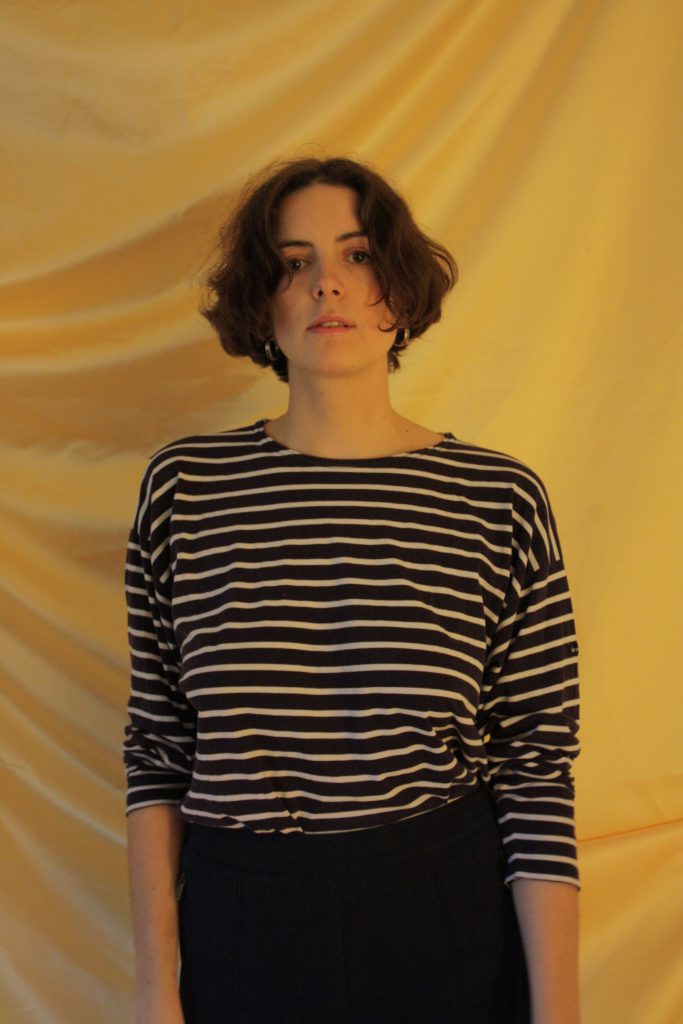
SNL: What are some common themes in most of your work?
MJ: I think it’s really when I am trying to understand a feeling. A lot of it will be when I feel like I’ve been hurt or abandoned, or when I have hurt or abandoned someone else. How can I understand these feelings and accept them as a part of life? Maybe that’s sort of the process of songwriting for me—the emotion will be really potent. I spend some time trying to articulate it either through the music or the lyrics or both, ideally. Then time passes and I have this relic of that process. Then it takes on new meaning, or I can play it and feel completely unencumbered by it. Some of the songs I’m playing now I wrote two years ago in the throes of some dramatic situation and now they are funny.
SNL: Yeah, a lot of people don’t necessarily have something that allows them to look back on something so specific. I’ve always thought about that—how people perform songs where they are talking about a specific moment in their life, and then performing it years later.
MJ: Yeah, it’s honestly the coolest thing. We’re made up of our experiences and our memories, and if you try to always live inside your memories or hold onto them, you’ll go crazy. You can’t move forward. I’m super nostalgic. I would hold on to, like, every fucking thing that happened that made me feel any sort of way. But now this is like—okay, well, I have this. This happened and it doesn’t define who I am at all. But, yeah. You move on.
SNL: Can you talk about the personality that’s on stage? Is that the same person that I’m talking to right now, or are they related in any way? Have you ever thought about this?
MJ: Yeah, I’ve thought about it. I don’t know. I’m still sort of navigating it, because I think I’m getting somewhere. I’m like, “Is Fran a character? Is it a version of me?” I don’t think it’s a separate character. I guess I’m still figuring it out. I’ve recently made the decision to really just let the songs happen. Because when I first started playing live, I used to freak out about banter, and I would think of jokes to tell, which will never work.
SNL: No. Also, I don’t know. I just really love when I go to a show and the person with the microphone doesn’t really say anything.
MJ: Yeah! It’s really powerful. So I think I just try to keep it as simple as I can. I’m starting to think more about my look, which can then set the tone. Fran can be both a man and woman’s name. Like my grandpa’s name was Fran.
“Enough” by Fran from debut EP “More Enough” out December 5, 2017 on Lake Paradise Records. Directed by Maria Jacobson. Shot and Edited by Tony Duvall in Chicago, IL.
SNL: Right. It’s your middle name.
MJ: My middle name, yeah. He went by Fran. It’s also a woman’s name. Fran. I’m trying to find some sort of middle ground between masculine and feminine. I got my palm read not too long ago, and the woman said something about my mercury line and that it was where my masculinity was. She thought that, moving forward, tapping into my masculine side might be beneficial to me and to my confidence. I’ve been thinking about that a lot and maybe trying to kind of play with that. It’s interesting. I don’t dress super feminine a lot but I like seeing if that affects how I perform or maybe changes how I see myself within a music scene or context. It is mostly a masculine scene. I can tap into my own masculinity—not that, like, everyone needs to do that or that that’s a good way to do it—but just, like, for me . So a lot of power pants. I like power pants.
SNL: Yeah, like the pink outfit you had at The Hideout.
MJ: Yeah, right! Like the suit–
SNL: –yeah, where it’s pink but it’s also…it’s a suit. It’s powerful.
MJ: Yeah, I know…finding that mix.
SNL: I’m always interested in how people come upon their own style, whether it be visual art or music. Who do you look to?
MJ: I think it all started for me with Joni Mitchell.
SNL: Oh! I was gonna say that somebody told me you’re the closest thing that they’d ever heard to Joni Mitchell.
MJ: Whoa! When I first heard her I was like, “Oh, this is a woman who is an incredible singer, who’s writing songs!” Like, you can do that? You know? And then it wasn’t until I heard Aimee Mann that I was like, “Oh, I can do that.”
SNL: Which is who I compared you to. I called my friend when I first heard you play and said, “Maria sounds like Aimee Mann—it’s like Aimee Mann.” And then when he saw you he was like, “I’m thinking Joni Mitchell.”
MJ: Way to go! Right on the nose. Aimee Mann does this thing with her songs where they are so simple and tight, but explode into melodies that unfold in this breathtaking way. They make you want to cry and make you horny at the same time, which is like, what I am trying to do here. I mean, I’m very into ‘90s female songwriters, like Liz Phair and Kristin Hersh from Throwing Muses. Then also just great songwriters throughout the ages like David Bowie or The Kinks, just writing these really smart songs, you know? It was really once I started writing songs I could revisit those artists and understand why, or try to learn why, their songs worked so well. It’s kind of been this amazing education that I didn’t realize was happening.
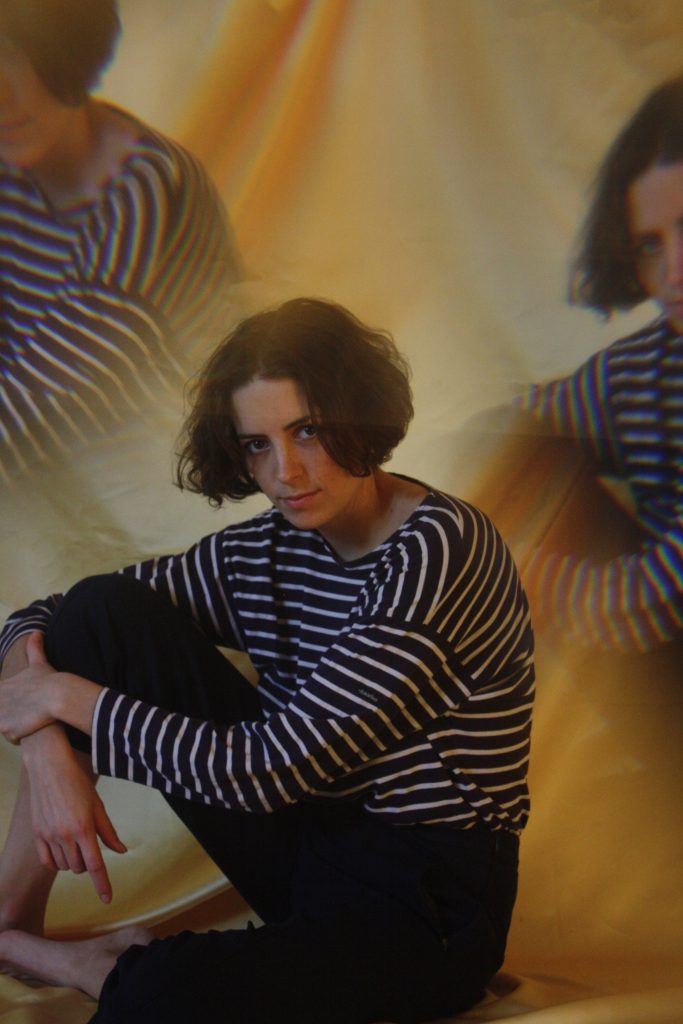
SNL: How has it been navigating the music scene in Chicago as a female?
MJ: Way more men—boys—are given guitars when they’re younger than girls are, for some reason. I mean, you know, that’s not a fact, but I’m pretty sure. Then there’s the gear, pedals, amps, PAs, and shit like that. I just started learning about that stuff a year and a half ago. So every time I go on stage—I’ve gotten better at it but—there’s always this feeling of, like, “Oh, I’m gonna concede to someone.” It always ends up being a dude. That’s really hard for me because it’s like, I don’t want to look stupid, but at the same time I may not knowing everything.
You also get grouped. A boy rock band is sort of “neutral.” They can play with anybody, they can play with each other. Then if you’re a female-fronted band it’s like, “Oh, you’re a female-fronted band.” I’ve been put on bills with a bunch of different women, which is great. But the show might have not made sense. It’s also frustrating for me because I see these bills for different shows around Chicago and it’s just the same boy bands playing with each other. I think I’m sort of beginning to break through that a little bit, and I really would like to start to challenge it. I feel like also—being a boy in music—probably all of your friends play music too, you know? So you all play together and you are in a bunch of bands and–
SNL: –help each other out.
MJ: Yeah. It’s been really hard for me to find good female-musician friends. I think we all just collectively feel it a little bit because we’re all constantly having to show up a little harder.
SNL: Prove yourselves to the boys club.
MJ: Yeah, exactly. It can be pretty exhausting. It does suck for it not to be like, “Oh, you are coming in to be an equal part.” It’s like, you have to get to the point where people are like, “Oh yeah, like, she’s chill, she’s one of us,” which is…
SNL: Right. It shouldn’t be like that.
MJ: Right, exactly. Yeah, so that does make me want to—in the future—organize shows, work on having diverse bills, different types of music, people of different sexes, races. The “rock” scene of Chicago is such a limited view of what’s actually happening.
It takes a lot of conscious work to work against it and to not feel like you’re being seduced by feeling like you are part of the club, you know? It’s cool, but, you know, there’s a lot more things going on that are really interesting—and that need a space as well.
SNL: Yeah. Do you mostly play at DIY venues or bars?
MJ: I’ve really only been playing out for less than a year. Year-ish? It’s been mostly at bars. I’m playing a DIY show in a couple weeks. But I really like doing both. I like how DIY shows magically bring in people that just want to hear music. That’s the coolest thing ever. At bars you sort of have to rely on either your friends coming or the other bands’ friends. That’s why I love the DIY shows. People are just down to hear music. It can sometimes be in weird quarters or not have the best sound or whatever—it’s fun.
SNL: How have you found a way to manage getting your work out there, emailing places, and then also just, like, having a life?
MJ: Only working four days a week has been really important. That’s why I’m so strung out. You have to treat it like a small business. When I first started, I was sort of crippled by stress about reaching out to people and like, what does it mean that they don’t respond to me? And like, “Ugh, no one will like me or my music. I’m such a dope.” You just have to develop a thick skin and be intentional with who you associate with and who you reach out to.
I think a big step in that was that I linked up with Lake Paradise Records, and Jake Acosta liked my music. It gave me a boost of confidence that someone believed in what I was doing. It gets really lonely when you’re doing it all yourself. It gets really easy to want to give up. Jake has been doing music stuff here for a long time. It’s about building these friendships and associations that are based around good music and good people. I think if you’re doing it for any other reason, either people will see through it or it will eventually crumble. To make connections for the sake of making connections sort of sucks. And with each email, and with each acceptance and rejection, I get stronger.
And I’m booking my first tour.
SNL: Oh, cool!
MJ: Yeah, it’s just a short tour, but I’ve spent whole days sending emails–emailing these people I don’t know, just bothering people, following up with them.
SNL: You have to be annoying.
MJ: You have to be annoying!
SNL: I know that as a writer. I totally get it. It’s okay! What’s the worst they’re going to do? Not respond? You know?
MJ: Yeah. Like, are they really going to say, “No, and I’m blacklisting you and telling all my friends to never book you.” That usually doesn’t happen. Unless you are a bad person. So just don’t be a bad person. Be polite, but be persistent.
On my good days, I think, “Oh yeah, I’m doing this because I feel that I have something good to offer people.” Not that I’m gonna save anyone or anything, but, “Hey! I’m bringing a good thing to your venue.”
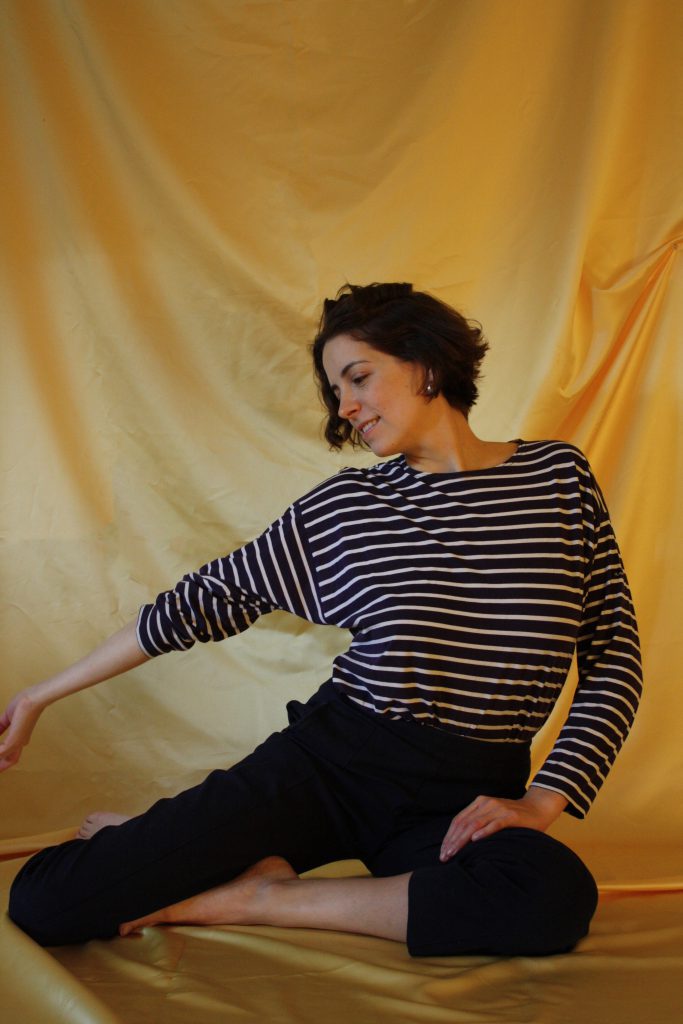
SNL: Where are you going on tour?
MJ: It’s still in the process. I’m going south through Indiana, so the focal point is Bloomington. I’m also trying to do a show in Champaign.
SNL: You’re having the tape release soon, right?
MJ: December 5th at the Empty Bottle. The tape comes out on Lake Paradise the same date.
SNL: Where do you see Fran in the future? What would be an ideal future?
MJ: One of my immediate goals is I really want to do a long, solo road trip. So I would like to book a solo tour of the western half of the United States and sort of make a fun road trip out of it, and go see nature and see friends I haven’t seen in a long time. On the grander scheme, I don’t know. I’m just sitting on tons of songs. It’s stressful sometimes. I want to record a full-length album and see where it goes from there. I want to keep making music, keep learning and meeting people. It’s the best I can hope for, honestly.
Since I’ve started doing music, I’ve met such incredible people—really talented, awesome people. I feel like it has made me see myself more clearly as an artist with a point of view and an artist who is always trying to refine my work. I’m trying to become an even better songwriter with each project, with each song.
Featured image: Standing, Maria looks over her left shoulder at the camera with her arm curled back to her right shoulder. Image courtesy of Hannah Siegfried.
 S. Nicole Lane is a visual artist and writer based in the South Side. Her work can be found on Playboy, HelloFlo, Rewire, SELF, and other corners of the internet, where she discusses sexual health, wellness, and the arts. Follow her on Twitter.
S. Nicole Lane is a visual artist and writer based in the South Side. Her work can be found on Playboy, HelloFlo, Rewire, SELF, and other corners of the internet, where she discusses sexual health, wellness, and the arts. Follow her on Twitter.
